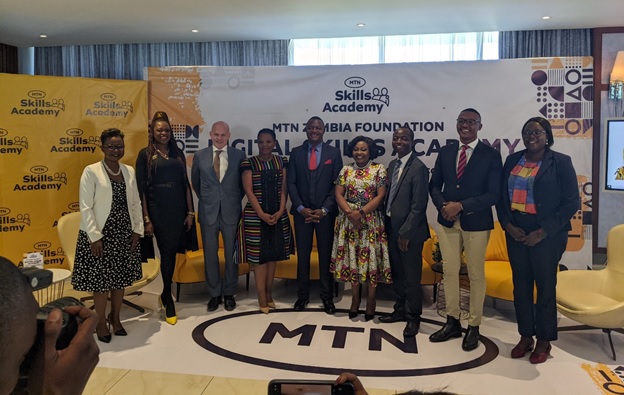MTN has today April 25, 2023 officially launched a digital skills academy, aimed at equipping the nation at large with digital skills. Ms Chilu Simukoko who gave a brief on the MTN foundation stated that MTN has always believed that, in attendance to the launch was Honorable Elvis Nkandu, minister of youth, sports and arts, Dr brilliant Habeenzu, permanent secretary of science and technology, Mr Bart Hofker, MTN CEO Zambia, Mr Lwando Buku Zambia Information and Communications Technology among many other invited guests.
Hon minister Elvis Nkandu as the guest speaker stated that he was grateful to be part of the launch of MTN skills academy, he stated that MTN digital skills academy will provide access to global opportunities, with this skills the people will be better equipped to work with clients and businesses worldwide. He pointed out that jobs in the digital economy tend to offer a higher pay and better benefits, thus by enrolling in the MTN digital skills academy young people in Zambia can expect to earn a higher salaries and reap numerous benefits. He stated that Zambia should get the lion’s share in digital skills from MTN Zambia especially that Zambia is currently lagging behind in the job sector.
A panelist discussion was held in which the ministry of Technology and Science representative, Mr Kumbuzo Nkunika the assistant director communications, stated that the 8th national development plan starts the journey for Zambia to become a digital economy in which, Zambia is still in its infancy. However, so far reviews of the ICT policy has commenced so that it is brought up to speed with the digital age. And in this strategy the main pillars is skills. Digital skills have to be brought to all age groups, as even the old will be in the digital age, however it is important to start with the young persons at entry level. He further stated that some of their partners are United Nations Capital Development Fund (UNCDF), MTN itself, UNISEF, UNTB etc, have been very helpful in this journey.
The director ICT from the ministry of education, Mr. Moses Phiri stated that in their quest to ensure that the young learners acquire digital education, the ministry has introduced in the past 2 years, a directory called early childhood education. Some of their partners among others are USAID, and MTN, to ensure that some curriculums are changed or reviewed so that some ICT subjects are introduced at grade 1-4. The ministry is also putting in place digital skills for those that failed at an early stage such as grade 7 or grade 9 to put their digital skills into entrepreneurship. The ministry of education has also introduced projects that focus on the girl child called “keeping girls in school” which currently is not country wide but covering only about 70 districts, in addition to this there’s another project put in place called the global fun project which focuses on the boy child.
CEO Mr. Bart Hafker, among other panelist commented that, the significance of the digital skills for Zambia can be really great, this program offers the opportunity for youth to participate in digital age. He stated that most appropriate skills one can learn from this program is online job orientation, job adverts are now migrating to digital advertising, MTN in itself merely advertises vacancies on LinkedIn and Go job Zambia of which if you are limited to physical or offline job searching then you’re limiting your possibilities of getting a job, hence if you have no digital skills you’re left out on a lot of opportunities, he said. He added that, more deeply digital skills is about how to build a business, how can your customers find you and how can you find your market.
In conclusion the launch of the MTN Digital Skills Academy, is a very significance milestone for Zambia’s digital development. The government’s commitment to promoting science technology and innovation in the education sector coupled with initiative such as the MTN Digital Skills Academy underscores Zambia’s determination to equip its youth with the skills necessary to thrive in the digital era, the government and other stakeholders must continue to invest in such initiatives to ensure that Zambia’s youths are well equipped and prepared to participate and succeed in the digital economy.




